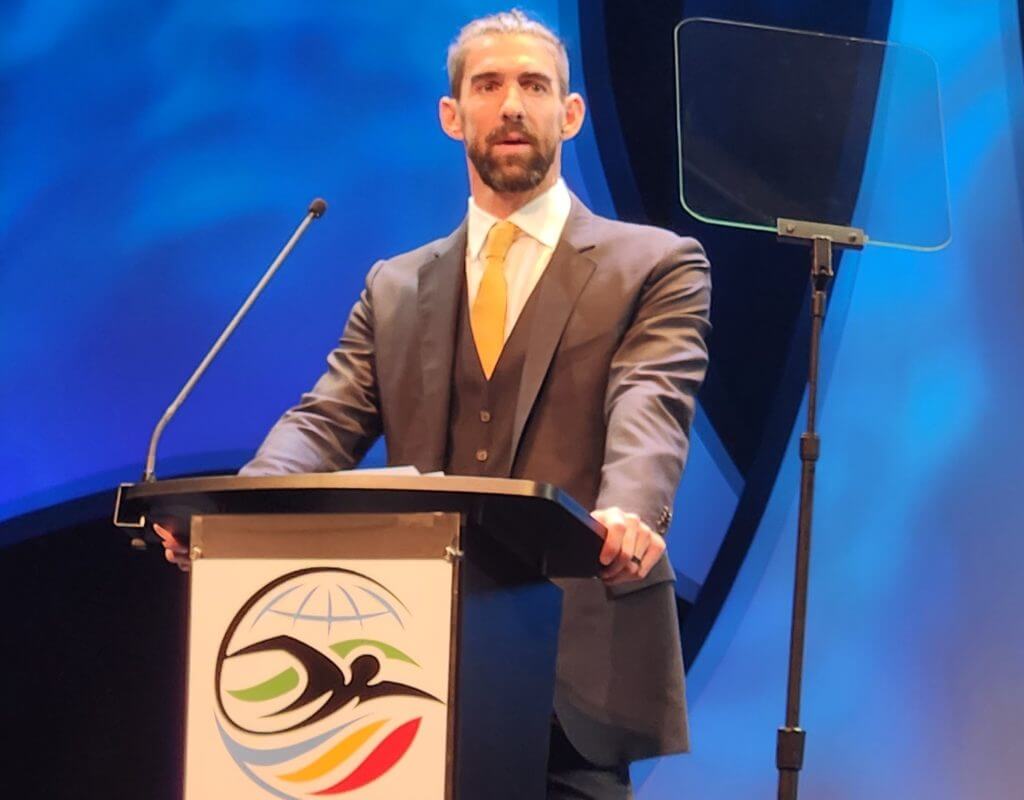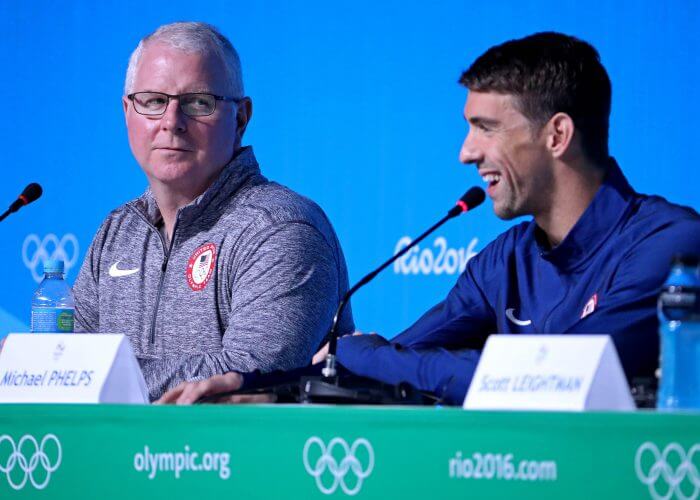The GOAT Turns 40: An Appreciation of the Career of Michael Phelps

The GOAT Turns 40: An Appreciation of the Career of Michael Phelps
The journey started where many stellar careers have been launched, in the pool at the North Baltimore Aquatic Club. It didn’t take long for the coaches to realize someone special was in the water, a young athlete with an undeniable upside. Age-group records suggested such potential.
Confirmation of his fledgling-superstar status arrived at the 2000 United States Olympic Trials in Indianapolis, when the 15-year-old stormed to a runnerup finish in the 200-meter butterfly. Off to the Sydney Games he went, and with the world watching, he narrowly missed the podium via a fifth-place finish. But big things were to come.
There would be a world record in the 200 fly the following spring and a world championship in the ensuing summer. His program ultimately grew, with his signature event complemented by ventures into the 200 freestyle, 100 fly and individual medleys. This expansion allowed for multi-medal hauls – and influence over the sport – at various stops around the world.
Twenty-eight Olympic medals – 23 of them gold. Thirty-nine world records. Five Olympiads. Thirty-three medals at the World Championships. Iconic comebacks. An athlete-coach relationship like no other. Countless youths inspired, these up-and-comers dreaming of being the next Michael Phelps.
Today, the GOAT turns 40.
It’s been nearly a decade since Phelps, after competing at the 2016 Olympic Games in Rio de Janeiro, bid farewell to the sport from a competitive standpoint. Fittingly, his final race yielded a gold medal, as Phelps handled the butterfly leg on the United States’ victorious 400 medley relay. These days, he is a husband and father to four boys. He is a leader in driving attention to mental-health awareness. He is a businessman.
Like other sporting legends, such as Jordan, Ruth and Gretzky, Phelps’ name never drifts far from swimming and Olympic conversations – no matter how many years pass. He remains the measuring stick for greatness and with that status, he’s someone youngsters still aim to be.
On this 40th birthday of Phelps, who was born June 30, 1985, it seemed appropriate to pay tribute to the Hall of Famer’s one-of-a-kind career.
The Athlete-Coach Partnership

Bob Bowman with Michael Phelps at Rio 2016 – Photo Courtesy: Peter Casey-USA TODAY Sports
Michael Phelps started working with coach Bob Bowman when he was 11 years old. Bowman immediately recognized the talent of his pupil and had the foresight to discuss his vision with Phelps’ parents before he was even a teenager. Simply, Bowman wanted everyone prepared for what might come.
Obviously, their partnership can be defined as epic. Rarely do swimmers stay with the same coach for the entirety of their careers, but when Phelps exited the pool, Bowman was still by his side. They had their flareups through the years, expected of any relationship. But they persevered, and Phelps’ words about Bowman say it all.
“He’s a father figure to me,” Phelps once said of Bowman. “He knew how to get the most out of me in the water, but he’s helped me through some of the worst times in my life. He’s been there every step of the way, and I’m forever thankful. I’ve said this all along. I don’t think I could have accomplished what I did with any other coach.”
The Great Eight
Standing in the aisle of the media seating at the 2008 Olympic Games, I remember watching Jason Lezak dive into the water for the anchor leg of the 400 freestyle relay. Phelps had led off in an American-record time of 47.51, but by this point in the race, with France well ahead, I thought: “Damn, only the second event of the week and the chase for eight gold is over.” Of course, Lezak stunningly reeled in Alain Bernard, the Americans came out on top and Phelps’ pursuit remained alive.
That week inside the Water Cube featured a combination of dominance and good fortune for Phelps on his way to a record eight gold medals – five individual and three relays. He delivered several overwhelming performances, including his opening triumph in the 400 individual medley and a 200 freestyle for the ages. There, too, was his down-to-the-touch decision in the 100 butterfly, in which he clipped Serbia’s Milorad Cavic by .01.
Greatness comes in many forms and that week in China offered different angles. It’s a week that won’t be forgotten.
Mental Strength
Look, Phelps was gifted with incredible physical talent and a body geared toward the sport – condor wingspan, long torso and large oxygen chamber. But those physical traits were backed up by a mental toughness and desire that cannot be measured. Phelps was unflappable and flourished in pressure-filled moments.
He never thought he was out of a race, thus his comeback victories in the 100 butterfly at the 2004 Olympics (over Ian Crocker) and 2008 Games (Cavic). More, he responded to challenges, such as Cavic calling him out at the 2009 World Championships in Rome. All Phelps did was rocket to a world record.
The passion Phelps exuded for Team USA was a trademark and, even now in retirement, that passion is evident. They say you can’t teach desire. Well, Phelps had it naturally, and it undoubtedly fueled his success.
At His Best
It’s difficult to choose a competition other than the 2008 Games as the point where Phelps was the best version of himself, but an argument can be made for the 2007 World Championships in Melbourne.
A year before the super-suit era was ushered into the sport, Phelps put on a show inside Rod Laver Arena. With five individual victories and a pair of relay golds, Phelps won seven titles Down Under, and only a disqualification in the prelims of the 400 medley relay left him short of going 8-for-8.
At the World Champs, Phelps set solo world records in the 200 IM, 400 IM, 200 butterfly and 200 freestyle. He won gold in the 200 fly by more than three seconds and his effort in the 200 freestyle took down Ian Thorpe’s world record and made Phelps the first man to crack the 1:44 barrier.
Almost Another One
During his career, Phelps set world records in five individual events and established American records in seven disciplines. Those tallies were nearly six and eight after what Phelps managed at the 2007 edition of the National Championships in Indianapolis.
A few months after his exploits in Melbourne, Phelps clocked 53.01 for the 100 backstroke in Indy, an effort that was just .03 off the world record of Aaron Peirsol. Because he never raced the stroke internationally, Phelps is underappreciated in the backstroke. Remember, at the 2004 U.S. Trials, he qualified for Athens in the 200 backstroke, only to decline the bid.
A Tip of the Cap
So, Michael Phelps is 40. He’s now a quarter-century removed from that “Hello World” moment in Indianapolis. A large percentage of conversations about great moments in the sport either focus on Phelps, or are connected in one way or another. He took fans on one hell of a ride, a journey that will be long remembered.



